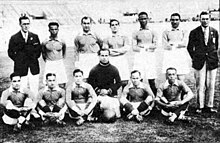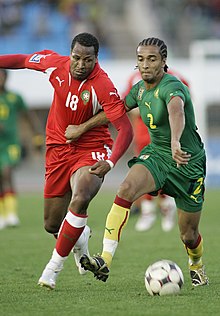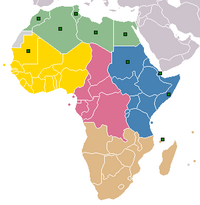Introduction
Football is the most popular sport in Africa. Indeed, football is probably the most popular sport in every African country, although rugby and cricket are also very popular in South Africa. (Full article...)

Selected article -
Tunisia is one of the most competitive African national teams in international football, having won one African Cup of Nations as hosts in 2004. They have made six FIFA World Cups and twenty Africa Cup of Nations tournaments, and participated in four editions of the Olympic football tournaments.
Selected biography -
Pienaar began his professional career at Ajax Cape Town, some 1,400 kilometres (870 mi) away from his home in Johannesburg. He was brought to the attention of Ajax CT whilst playing for the School of Excellence and was asked to join their youth academy. At the age 18, he moved to the Netherlands to join Ajax in January 2001 but did not make his Eredivisie début until 24 February 2002 – in a 1–0 victory over NAC Breda. He became a pivotal member of the Ajax team that won the Dutch League in 2002 and 2004.
In January 2006, German club Borussia Dortmund signed Pienaar on a three-year contract from Ajax. Seen as a replacement for Arsenal-bound Tomáš Rosický, Pienaar's first year with Borussia Dortmund saw him receive the number 10 shirt vacated by the Czech playmaker. Pienaar struggled at Dortmund and never felt truly accepted by the other players at the club. He then joined Everton on loan for 2007–08 and later signed a three-year contract from Dortmund for a pre-agreed fee of £2 million after payment of an initial loan fee of £350,000 in April 2008.
In January 2011, both Chelsea and Tottenham Hotspur had bids accepted to buy Pienaar from Everton before the South African joined Spurs for a fee of £3 million on a four-year contract. His spell at Tottenham was characterised by persistent injuries and not much impact in games which resulted him rarely featuring in the team. Late on transfer deadline day in January 2012, Pienaar completed a return to Everton on a six-month loan deal. A permanent transfer was agreed in July 2012, with Everton paying Tottenham Hotspur a fee of £4.5 million. On 19 August 2016, Pienaar signed a one-year contract with Sunderland before returning to South Africa, signing a one-year deal with Bidvest Wits in July 2017. He was released six months later and retired from professional football in March 2018.
Selected image -

Subcategories
Related portals
More sports portals
WikiProjects
Related task forces and sub-projects
African football task force
WikiProject Africa • WikiProject Football
WikiProject Football task forces and sub-projects
Topics
Open tasks

- Expand stubs: Competitions in Africa • Organizations
- Expand club articles of teams from Africa.
- Expand biographies of Africans involved in football.
- Create: Requested articles • Most wanted football articles • Requested general football articles
- Add: Infoboxes • Images (General requests, Requested images of people)
- Review: articles currently under review
- Assess: Assessment requests • Assess an article
- Revert vandalism on this portal and on African football articles
- Assist in maintaining this portal and keeping its selected content up to date.
- WikiNews: Create and submit news stories about African football for Wikipedia's sister project WikiNews.
Associated Wikimedia
The following Wikimedia Foundation sister projects provide more on this subject:
-
 Commons
Commons
Free media repository -
 Wikibooks
Wikibooks
Free textbooks and manuals -
 Wikidata
Wikidata
Free knowledge base -
 Wikinews
Wikinews
Free-content news -
 Wikiquote
Wikiquote
Collection of quotations -
 Wikisource
Wikisource
Free-content library -
 Wikiversity
Wikiversity
Free learning tools -
 Wiktionary
Wiktionary
Dictionary and thesaurus
More portals
Sources

- ^ "The History Of Soccer In Africa". NPR.org. 2010-06-09. Retrieved 2016-03-31.
- ^ a b c Alegi, Peter (2010). African Soccerscapes. Ohio University Press. pp. 1–2. ISBN 9780896802780.
- ^ Frimpong, Enoch Darfah. "Ghana news: A world of superstition, frustration and disillusionment - Graphic Online". Retrieved 23 September 2017.
- ^ Lacey, Marc (8 August 2002). "Kangemi Journal; For Spellbinding Soccer, the Juju Man's on the Ball". The New York Times. NY Times. Retrieved 2016-03-31.
- ^ "World Cup Witchcraft: Africa Teams Turn to Magic for Aid". National Geographic. Archived from the original on July 10, 2006. Retrieved 2016-03-31.
- ^ Andy Mitten (September 2010). The Rough Guide to Cult Football. Rough Guides UK. ISBN 9781405387965. Retrieved 2016-04-02.
- ^ "African Nations Cup overshadowed by hocus pocus | Football". The Guardian. Retrieved 2016-04-09.
- ^ Kuper, Simon (2006). Soccer Against the Enemy: How the World's Most Popular Sport Starts and Stops Wars, Fuels Revolutions, and Keeps Dictators in Power. Nation Books. p. 123. ISBN 978-1-56025-878-0.



















